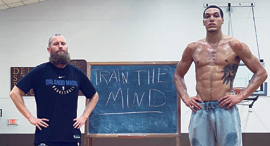What Can Corona-Fighting Doctors Learn From Sports Psychology?
Hundreds of billions of dollars need to be invested in the emotional health of medical staff when the coronavirus pandemic ends. But right now, with the world outbreak not even at its peak, we need some sports psychologists in emergency rooms.
One of the main challenges facing athletes suffering from emotional distress is that the psychologists they meet tend to be experts in sports psychology. "A sports psychologist doesn't check how you are feeling as a person. That isn't their mandate or expertise," a top Israeli athlete who has experienced such difficulties told Calcalist. "You have a problem, but the psychologist helps you solve it only as it relates to your performance."
This approach is no coincidence. "Sports psychology isn't 'talk therapy', it is psychology aimed at improving results," Boris Blumenstein, head of Wingate's Sports Psychology Department, and a former coach of world records holders and gold medalists, once told me. "A sports psychologist needs to give the athlete the tools to create an ideal competitive mentality."

That is exactly the role of sports psychology: to deflect or blur the type of deep-rooted issues addressed in 'talk therapy,' the type of issues that are connected to matters far deeper than poor free-throw shooting. Its role is to provide the athlete with a specific short-term solution.
Most of the meta-analysis examining common interventions in sports psychology showed that they are very effective at solving immediate issues. Tools like guided imagery, setting goals and cognitive behavioral therapy (CBT) allow athletes to put aside their troubles and focus on the mission at hand. That course of behavior, of course, comes at a price. Glossing over deep-rooted problems doesn't make them disappear. Many athletes, like all of us, experience emotional difficulties, some of them serious — from paralyzing anxiety to depression. Forward-thinking sports organizations have started to understand this and in recent years have begun to provide athletes with access to independent psychotherapy, beyond the treatments they receive to enhance their athletic performance. The need for immediate results that’s so dominant in sports psychology is perhaps best summed up by a saying by prominent sports psychologist Graham Betchart who said in a 2017 interview: "we’re not trying to save a 25-year-old, we’re trying to train a 15-year-old, which is a much different philosophy."
Understanding the advantages and disadvantages of sports psychology is particularly relevant today, with medical staff around the world facing unprecedented levels of stress. Coronavirus (Covid-19) has brought health systems in many places to the verge of collapse, with caregivers feeling that they are carrying the stress of the entire system, nation and world on their shoulders.
Even prior to the coronavirus outbreak, doctors were in the high-risk group for emotional difficulties. Research conducted in the U.S. in 2018 found that one American doctor commits suicide every day on average and that doctors’ suicide rate averages 12.3 per 100,000 doctors - more than double of any other profession. The reasons for that are varied, with researchers highlighting a heavy workload, lack of sleep and most prominently the emotional toll of making medical decisions that can have a dramatic impact on the life of patients.
These issues are all multiplied tenfold during a world pandemic. A recent paper titled 'Factors Associated With Mental Health Outcomes Among Health Care Workers Exposed to Coronavirus Disease 2019' published by The Journal of the American Medical Association (JAMA) examined the mental health status among health care workers in Wuhan, China where the initial outbreak of coronavirus occurred. The cross-sectional study of 1,257 health care workers in 34 hospitals equipped with fever clinics or wards for patients with Covid-19 showed that "a considerable proportion of participants reported symptoms of depression (50.4%), anxiety (44.6%), insomnia (34.0%), and distress (71.5%)."
This is heartbreakingly understandable. After all, who wouldn't be mentally crushed by having to decide which patient will be treated with a ventilator and which won’t, or being forced to see elderly patients die without any relatives to support them?
After this is all over, hundreds of billions of dollars will be invested in health systems and medical staff. An important part of that money must be invested in the emotional wellbeing of the health care workers and in 'talk therapy.' But right now, with the world pandemic not even at its peak yet, we need some sports psychologists in the emergency rooms. The doctors are now 'athletes' competing against an opponent that never rests. They need anything that can help them win this race. We don't have time for talk therapy now.



